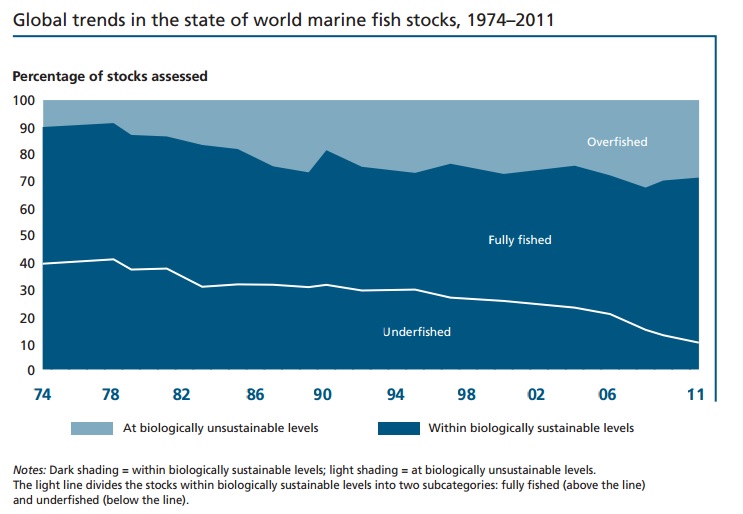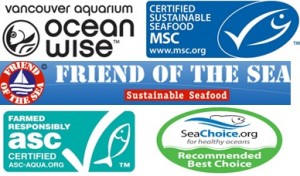I love the ocean and I want to protect it from the current state of decline. But I also love eating seafood and I know I’m not the only one in this position, especially in my current location in the City of Vancouver. How can you live here and resist sushi? Can it be wrong to love both the ocean and eating seafood?

Sushi from Sushi Oyama. Photo taken by Eva Chu.
According to the U.N. Food and Agriculture Organization, about 90% of global marine fish stocks are stressed – fished at the maximum level or at an unsustainable level (overfished). Decline of fish stocks is both a driver and an effect of ocean decline and to recover the stocks means to stop the overfishing (yes, this is an overly simplified statement, bear with me here).

Global trends in the state of world marine sh stocks, 1974–2011. Figure 13 from The State of World Fisheries and Aquaculture by the Food and Agriculture Organization of the United Nations.
Simply put, it seems that if I eat seafood, I am contributing to the problem…
But it’s as if the world knew that people like me would be trying to balance both loves and came up with a solution to my dilemma!
Vancouver Aquarium’s Ocean Wise™ symbol next to a seafood item assures me that what I am eating is a sustainable and ocean-friendly seafood choice. And I can also look to the Marine Stewardship Council (MSC) for comfort by looking for the blue MSC ecolabel for certified sustainable seafood, which ensures me that the seafood came from, and can be traced back to, a sustainable fishery.
There is also Friend of the Sea’s certification of sustainable seafood from fisheries and aquaculture, Aquaculture Stewardship Council’s certification, or even SeaChoice’s recommendations (complete with a Sustainable Sushi Guide!). Two MSC reports show that there has been a great increase in MSC-labelled products.

Vancouver Aquarium Ocean Wise, MSC Certified Sustainable Seafood, Friend of the Sea Sustainable Seafood, ASC Certified, SeaChoice Recommended Best Choice. Logos from respective organizations.
Doesn’t this all sound like a wonderful situation for a seafood and ocean lover? Hurray for sustainable seafood!
BUT (there’s always a but), all things “good” should be taken with a grain of salt. None of these certifications provide a definitive solution to overfishing – we need to understand that certifications are [definitely] not the only solution and we should be asking if sustainable-labeled seafood is really sustainable and what these labels actually mean.
Something to keep in mind is that the MSC is just a standard for sustainability that commercial auditing companies make use of to decide if a fishery is “sustainable” by MSC’s definition. The fishery gets the blue ecolabel if the auditors decide they meet those standards and there are numerous commercial auditing companies that exist.
All these sustainability labels sure make me feel better about my consumption of seafood, but the world’s fisheries are still being depleted. The sustainable certifications are not a catch-all solution for overfishing, they are a business catered to draw in a specific type of consumers (like myself).
But, of course, this isn’t entirely useless for ocean conservation and sustainability. I’d say these certifications and labels are excellent at raising awareness and generating discussion – it made me write an entire blog. What will you do with this information?
References:
Continue reading